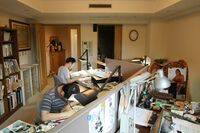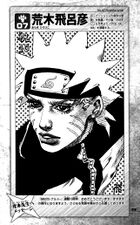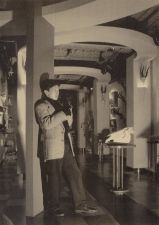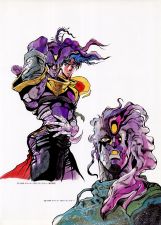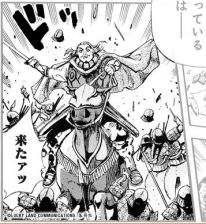Hirohiko Araki
Biography
- Hirohiko Araki was born on June 7 1960 in Sendai, Japan.
- Araki left before graduation from Miyagi University of Education.
- Araki is best known for JoJo's Bizarre Adventure, published in Weekly Shonen Jump from 1987 to 2002, before the series transferred to the seinen magazine Ultra Jump in 2004.
- Araki's Buso Poker was a "Selected Work" at the Tezuka Award in 1980.[1]
- In 2012, Araki celebrates his 30th year as a manga artist and the 25th anniversary of JoJo’s Bizarre Adventure.
- His favorite color is a mix of dark moss green and white.Cite error: Invalid
<ref>tag; invalid names, e.g. too many
JoJo's Bizarre Adventure
The story in JoJo begins within the deceitful relationship between villain Dio Brando, arriving from a poor and abusive background, and hero Jonathan Joestar, the son of a wealthy and benevolent Lord. Attrition between Jonathan's descendants and Dio's subjects and followers provides the main source of continuity in the series, which between the 18th century and the present day visits England, the U.S., Italy and Japan, most prominently.
The series spans a range of genres including Horror, Action, Adventure, Paranormal romance, Mystery and Thriller. Recurrent themes include Fate, Fortunity, Justice, Redemption, Psychology, and the human utility of Energy, Gravity and Time.
Many references to modern film, television, fashion, popular music and fine art are readily identifiable throughout JoJo in many settings and the characterization and background of the cast. Examples of scientific, mathematical and psychological theory, technology, myths, current events and natural phenomena inform the functions of JoJo's multitude of unique Stand powers.
Morioh, fictional Japanese town and base of Part IV: Diamond is Unbreakable and the ongoing Part VIII: Jojolion is likely to represent Araki's own residence(s) and serve the most contemporary topics in JoJo (e.g. the 2011 Tohoku earthquake). Stand-wielding mangaka Rohan Kishibe, introduced in Diamond is Unbreakable and guide in a handful of JoJo spin-offs, seems likely as a self-insert.
Style and Influences
A consistent element of Araki's drawing is a highly dynamic treatment of the picture plane, to which anatomy, angle and range is subject.
In terms of cartooning, a comparison can be drawn between Phantom Blood, Battle Tendency and Stardust Crusaders (1987 - '92) and the masculine physiological ideals described by Tetsuo Hara in Fist of the North Star. Diamond is Unbreakable ('92 - '96) marks a transition to a more intersexual model. Steel Ball Run (2004 - '11) sees greater realism, along with the integration of ideals of beauty consistent with the mode in fashion modelling.
Araki has named Paul Gauguin and his approach and contribution to color theory as a key influence.
Publication
Many of Araki's creations including JoJo's Bizarre Adventure have been translated and released in Europe, but so far only JoJo and Baoh have been released in the U.S., one theory being that Araki's frequent references to Western music, film and others violate U.S. copyright law. Publications by Viz Media replace certain references within the copy of the manga with thematically comparable alternatives. The American localization of Capcom's fighting games based on JoJo follow the same procedure.
Works
- Buso Poker (1980)
- Autoto Man (1982)
- Virginia ni Yohroshiku (1982)
- Magic Boy B.T. (魔少年ビーティー mashōnen bītī 1982–1983)
- Baoh (1984–1985)
- Gorgeous Irene (1985–1986)
- JoJo's Bizarre Adventure (1987—current)
- Part I: Phantom Blood (1987-1988)
- Part II: Battle Tendency (1988-1989)
- Part III: Stardust Crusaders (1989-1992)
- Part IV: Diamond is Unbreakable (1992-1996)
- Part V: Vento Aureo (1996-1999)
- Part VI: Stone Ocean (2000-2003)
- Part VII: Steel Ball Run (2004-2011)
- Part VIII: Jojolion (2011-current)
- JoJo 6251 (1993) (Artbook)
- Under Execution, Under Jailbreak (Collection) (1999)
- JOJO A-GO!GO! (2000) (Artbook)
- The Lives of Eccentrics (2004)
- Thus Spoke Rohan Kishibe - Mutsukabezaka (2006)
- Front cover of Cell (scientific journal) (September 7, 2007)
- Rohan at the Louvre (2010)
- Rohan Kishibe Goes to Gucci (2011)
- Thus Spoke Rohan Kishibe. Episode 5: Village of Millionaires (2012)
References
</references>
